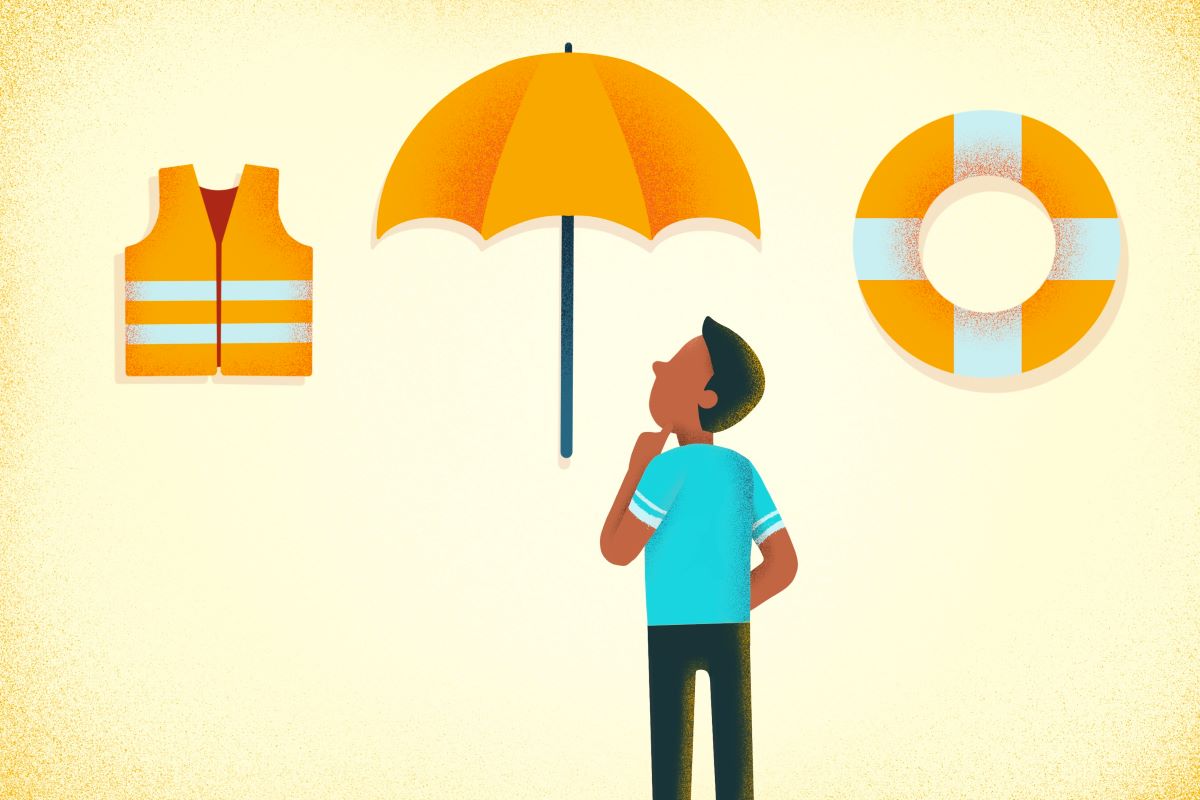Home>Finance>What Are Four Ways That Life Insurance For Teenagers Can Be Helpful?


Finance
What Are Four Ways That Life Insurance For Teenagers Can Be Helpful?
Modified: February 21, 2024
Discover how life insurance for teenagers can benefit your family's finances with these four key ways. Secure their future today
(Many of the links in this article redirect to a specific reviewed product. Your purchase of these products through affiliate links helps to generate commission for LiveWell, at no extra cost. Learn more)
Table of Contents
Introduction
Life insurance is often associated with older adults who have dependents and financial responsibilities. However, it can also be beneficial for teenagers. While the thought of life insurance may seem unusual for young individuals, there are several ways it can be helpful for them. In this article, we will explore four key ways that life insurance for teenagers can provide financial protection and set them up for a secure future.
Life insurance for teenagers may not be a common topic of conversation among parents or educators, but it can offer valuable benefits that extend beyond the traditional purpose of providing death benefits. It can be a proactive step towards financial planning and building a solid foundation for later stages in life.
By understanding the potential advantages of life insurance for teenagers, parents can make informed decisions about whether it is a suitable investment for their child. It is essential to consider factors such as the financial stability of the family, the long-term objectives for their teenager, and the available options for life insurance policies.
Financial protection for the future
One of the primary reasons why life insurance for teenagers can be helpful is that it provides financial protection for their future. While it may seem counterintuitive to insure someone so young, there are key advantages to starting a life insurance policy early.
Life insurance can provide a safety net for unexpected situations. By securing a life insurance policy for your teenager, you ensure that they are protected financially in the event of their untimely death. While this is a difficult topic to consider, it is important to acknowledge that accidents and illnesses can happen at any age. By having life insurance in place, you can alleviate the financial burden on your family during an already challenging time.
Furthermore, life insurance for teenagers often comes with affordable premiums. Young individuals typically have good health, which can result in lower insurance rates. By starting a policy while your teenager is young and healthy, you can lock in lower premiums for the future. This can be particularly beneficial if your child develops any health conditions later in life, as the policy would already be in force.
In addition to providing coverage in the event of death, some life insurance policies for teenagers also offer options for living benefits. These benefits can include coverage for critical illnesses or disabilities. By opting for a policy that includes living benefits, you can provide your teenager with a financial safety net if they were to experience a serious health condition.
Overall, financial protection for the future is a significant advantage of having life insurance for teenagers. It ensures that they are covered in the event of their unexpected passing and offers peace of mind to both the teenager and their family.
Accumulating cash value
Another way that life insurance for teenagers can be helpful is by allowing them to accumulate cash value over time. Cash value is a unique feature of certain types of life insurance policies, such as whole life insurance or universal life insurance.
When you purchase a life insurance policy for your teenager, a portion of the premium payments goes towards building cash value. This cash value grows over time, typically on a tax-deferred basis, meaning you don’t have to pay taxes on the growth until you withdraw the funds.
Accumulating cash value can provide several benefits for teenagers. Firstly, it serves as a savings component, allowing teenagers to build up funds that they can access in the future. This can be especially advantageous as they transition into adulthood and face expenses such as higher education, buying a car, or starting a business.
In addition, cash value can be used as collateral for loans. If your teenager needs to borrow money in the future, they can use the cash value of their life insurance policy as a source of collateral. This can make it easier for them to secure a loan and potentially at a lower interest rate compared to other types of loans.
Furthermore, cash value can provide a financial safety net in times of need. If your teenager encounters unexpected expenses or financial difficulties, they may be able to take out a loan against the cash value of their life insurance policy to help cover these costs. While it is important to consider the potential impact on the policy’s death benefit, having this option can provide valuable flexibility.
Overall, by accumulating cash value, life insurance for teenagers offers a unique opportunity to build savings and provide financial flexibility for their future needs.
Establishing a lifelong savings habit
Life insurance for teenagers can play a critical role in fostering a lifelong savings habit. By starting a life insurance policy at a young age, teenagers are introduced to the concept of saving money for the long term.
When teenagers are included in financial discussions and introduced to the idea of managing their finances early on, they gain a valuable understanding of the importance of saving for the future. Life insurance serves as a tangible example of how saving money can have long-term benefits.
By paying premiums towards their life insurance policy, teenagers develop a sense of responsibility in meeting financial obligations. They learn the value of regular contributions and the impact it has on the policy’s growth and overall financial security.
Furthermore, life insurance policies for teenagers often offer the opportunity to increase the coverage amount over time. This option encourages teenagers to reassess their coverage needs periodically and adjust their policy accordingly. This practice reinforces the importance of evaluating and adapting financial plans throughout their lives.
In addition to simply contributing to the policy’s premiums, parents can involve teenagers in the decision-making process. This can include discussing different types of life insurance policies, exploring coverage options, and understanding how policy features work. By involving teenagers in these discussions, they become more informed about financial matters and develop critical thinking skills when it comes to making decisions about their own finances.
Overall, life insurance for teenagers can serve as a catalyst for establishing a lifelong savings habit. It introduces them to the concept of saving money for the future, promotes responsibility with financial obligations, and instills the importance of regularly evaluating and adapting financial plans throughout their lives.
Building a credit history
Life insurance for teenagers can also help in building a credit history, which is essential for their financial well-being in the future. A strong credit history is crucial when it comes to obtaining loans, securing favorable interest rates, and demonstrating financial responsibility.
When teenagers have a life insurance policy, they start establishing a financial footprint early on. Insurance companies report policyholders’ payment history to credit bureaus, which then becomes a part of their credit report. This means that as teenagers consistently pay their life insurance premiums, they are building a positive credit history.
A positive credit history is advantageous because it shows lenders that an individual is reliable and capable of fulfilling their financial obligations. This can help teenagers when they need to apply for student loans, car loans, or even their first credit card. Having a solid credit history increases the likelihood of being approved for these financial products and can potentially result in better interest rates and terms.
By starting to build a credit history through a life insurance policy, teenagers learn the importance of managing their finances responsibly from an early age. They understand the impact that timely payments and responsible financial behavior have on their creditworthiness.
Parents can also use this opportunity to educate teenagers about the importance of maintaining a good credit score. They can explain how credit scores are calculated, the factors that influence creditworthiness, and the long-term benefits of having a positive credit history.
It’s important to note that while life insurance premiums contribute to building a credit history, it’s still crucial for teenagers to develop other credit-building habits. This can include obtaining a credit card in their name, managing it responsibly by making timely payments, and keeping credit utilization low.
By having a life insurance policy, teenagers can start building a credit history that lays the foundation for their financial future. It instills the value of responsible financial behavior and sets them on a path towards establishing a solid credit profile.
Conclusion
While the idea of life insurance for teenagers may initially seem unusual, there are several ways it can be helpful and advantageous. From providing financial protection for the future to accumulating cash value and fostering a lifelong savings habit, life insurance offers unique benefits for teenagers.
Firstly, life insurance ensures financial protection in the unfortunate event of a teenager’s untimely death. It offers peace of mind and eases the financial burden on their family during such difficult times. Additionally, it comes with affordable premiums and the potential for living benefits, further enhancing its value.
Moreover, life insurance policies for teenagers provide an opportunity to accumulate cash value over time. This cash value can serve as a savings component and be accessed in the future for various needs. It can also be used as collateral for loans, providing financial flexibility when teenagers require financial assistance.
Life insurance for teenagers also plays a crucial role in fostering a lifelong savings habit. By involving them in financial discussions, teaching responsibility in meeting financial obligations, and encouraging periodic evaluations of their coverage needs, teenagers learn the importance of saving and adapting their financial plans throughout their lives.
Lastly, life insurance helps teenagers build a credit history. By consistently paying their premiums, they establish a positive credit footprint that can benefit them when they need to apply for loans or credit cards in the future. This early exposure to credit helps instill responsible financial habits and understand the significance of maintaining a good credit score.
In conclusion, life insurance for teenagers is not only about providing financial protection but also about setting a solid foundation for their future. It teaches them important life skills, such as savings habits, responsible financial behavior, and the value of a strong credit history. By considering the potential benefits, parents can make informed decisions about whether life insurance for their teenagers is a worthwhile investment.














